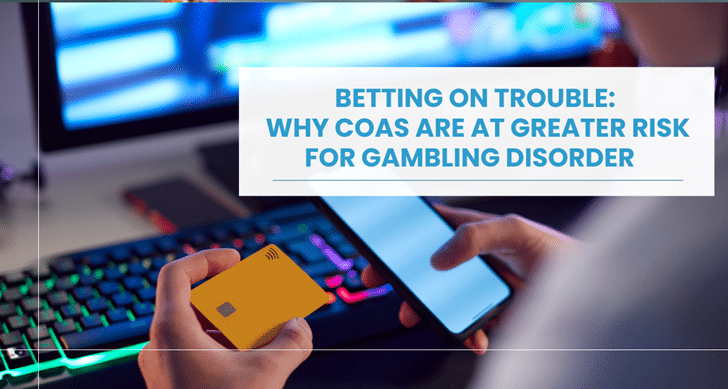As we observe Problem Gambling Awareness Month (PGAM) this March 2025, it’s crucial to shed light on the escalating issue of problem gambling, especially among individuals from families predisposed to the disease of addiction. The theme “Seeking Understanding” resonates deeply as we explore the intersection between gambling disorder and children impacted by addictions (COAs), who may be at heightened risk for such behaviors.
The Rise of Online Gambling
The landscape of gambling has transformed dramatically in recent years, primarily due to the proliferation of online platforms and the legalization of sports betting across numerous states. In 2018, the U.S. Supreme Court lifted the federal prohibition on sports betting, leading to rapid expansion in the industry. By 2023, gross gaming revenue from sports betting reached $10.9 billion, with Americans wagering nearly $120 billion on legal sportsbooks, up from $93 billion in 2022. This surge is further evidenced by the online gambling market’s growth, which increased from $2.5 billion in 2018 to close to $20 billion in 2023.
Impact on Children Impacted by Addictions (COAs)
Children raised in environments where alcohol misuse is prevalent often face unique challenges that can influence their susceptibility to addictive behaviors, including gambling. Research indicates that COAs are more vulnerable to developing psychopathologies compared to their peers without parental addiction histories. This increased vulnerability can be attributed to genetic predispositions, environmental stressors, and learned behaviors.
Studies have shown that children of parents who gamble excessively are at a consistently greater risk of developing gambling problems themselves. This risk is compounded when considering the overlap between alcohol misuse and gambling behaviors within families.
Gambling as a Substitute Addiction
For individuals recovering from substance use disorders, including alcohol use disorder, gambling can present a tempting alternative due to its ability to stimulate the brain’s reward system similarly to substances. The allure of immediate gratification inherent in gambling activities poses a significant risk for cross-addiction. The accessibility and anonymity of online gambling platforms exacerbate this issue, making it easier for individuals to engage without immediate social repercussions.
Challenges in the Digital Age
The digitalization of gambling has made it more challenging for individuals with addictive tendencies to resist. The convenience of placing bets from personal devices, coupled with targeted advertising and promotions, creates an environment where gambling is constantly within reach. This omnipresence can be particularly hazardous for COAs and those in recovery, as the temptation is perpetually accessible.
Signs and Symptoms of Problem Gambling
Recognizing the signs of problem gambling is essential for early intervention. Some indicators include:
- Preoccupation with gambling activities.
- Increasing amounts of money wagered to achieve desired excitement.
- Repeated unsuccessful attempts to control or stop gambling.
- Restlessness or irritability when attempting to reduce or cease gambling.
- Gambling as a means to escape problems or relieve negative emotions.
- Jeopardizing significant relationships, employment, or educational opportunities due to gambling.
It’s important to note that problem gambling, also referred to as “gambling disorder,” is recognized as a mental health condition that can have severe social, financial, and emotional consequences for an individual and their families.
The Need for Awareness and Support
Given the rapid expansion of online gambling and its associated risks, especially among vulnerable populations like COAs, there is an urgent need for increased awareness and support. Educational initiatives targeting these at-risk groups are crucial. Healthcare providers should incorporate regular screenings for gambling behaviors, particularly when working with individuals from families with a history of the disease of addiction.
As we navigate the evolving landscape of gambling in the digital age, it’s imperative to recognize and address the heightened risks faced by children impacted by the disease of addiction and individuals in recovery. By fostering understanding, promoting preventive measures, and providing robust support systems/treatment, we can help to mitigate the impact of problem gambling and safeguard the well-being of vulnerable populations.
The promotion of resources such as helplines, support groups, and counseling services can provide necessary assistance to those struggling with gambling-related issues. The Substance Abuse and Mental Health Services Administration (SAMHSA) offers a free, confidential, 24/7 helpline for individuals facing mental and/or substance use disorders.
- 1-800-662-HELP (4357)
- TTY: 1-800-487-4889
- Text your 5-digit ZIP Code to 435748 (HELP4U)
- In English and Spanish
If you or someone you know may have a gambling problem, contact The National Problem Gambling Helpline. Help is available 24/7 – it is free and confidential, offered without blame or shame.
- 1-800-GAMBLER
- text 800GAM
- www.1800gamblerchat.org
For additional assistance and resources, NACoA provides two additional blogs to support families impacted by the effects of problem gambling:
